Photo by Maria Lupan on Unsplash Practice Related to Perspectives, Frameworks, & Theories Commonly Used in Social Work Jacob Campbell, Ph.D. LICSW at Heritage University Fall 2023 SOWK 486w
Slide 1

Slide 2

Agenda Plan for Week 02 Perspectives, theories, and frameworks Systems theory Ecological perspective Strengths perspective Solution-focused brief therapy
Slide 3

Perspectives vs Theories & Frameworks +
Slide 4

Perspectives: A way of perceiving the world ows from a value position fi fl + Theory: A general statement about the real world whose essential truth can be supported by evidence obtained through the scienti c method Framework or Model: Is a blueprint for action. It describes what happens in practice in a general way.
Slide 5

Systems Theory Input System Output Equi nality Pressure Homeostasis Pressure fi (Kirst-Ashman & Hull, 2015)
Slide 6
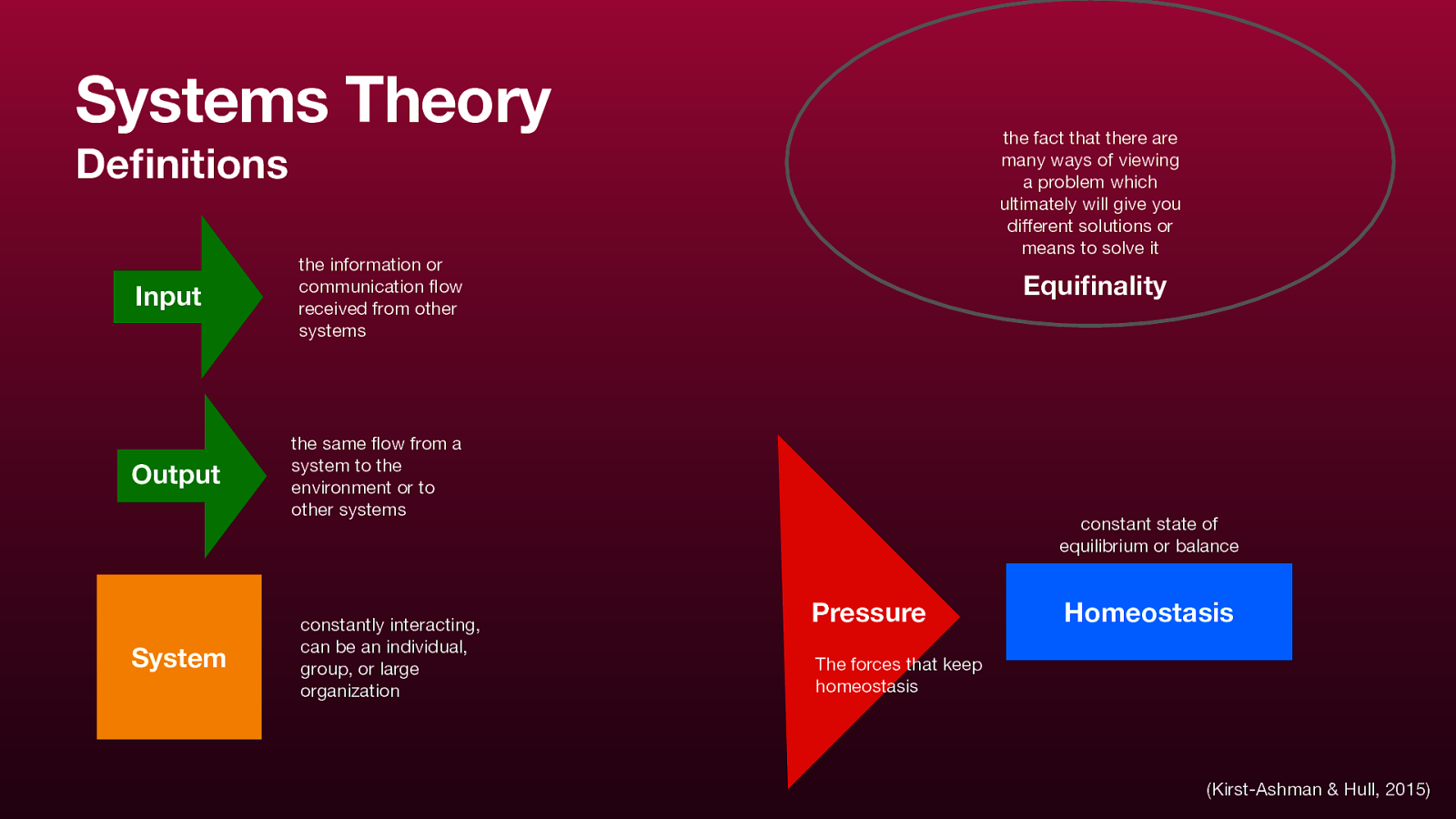
Systems Theory the fact that there are many ways of viewing a problem which ultimately will give you di erent solutions or means to solve it De nitions Input Output System the information or communication ow received from other systems Equi nality the same ow from a system to the environment or to other systems constantly interacting, can be an individual, group, or large organization constant state of equilibrium or balance Pressure Homeostasis The forces that keep homeostasis fl fl fi fi ff (Kirst-Ashman & Hull, 2015)
Slide 7
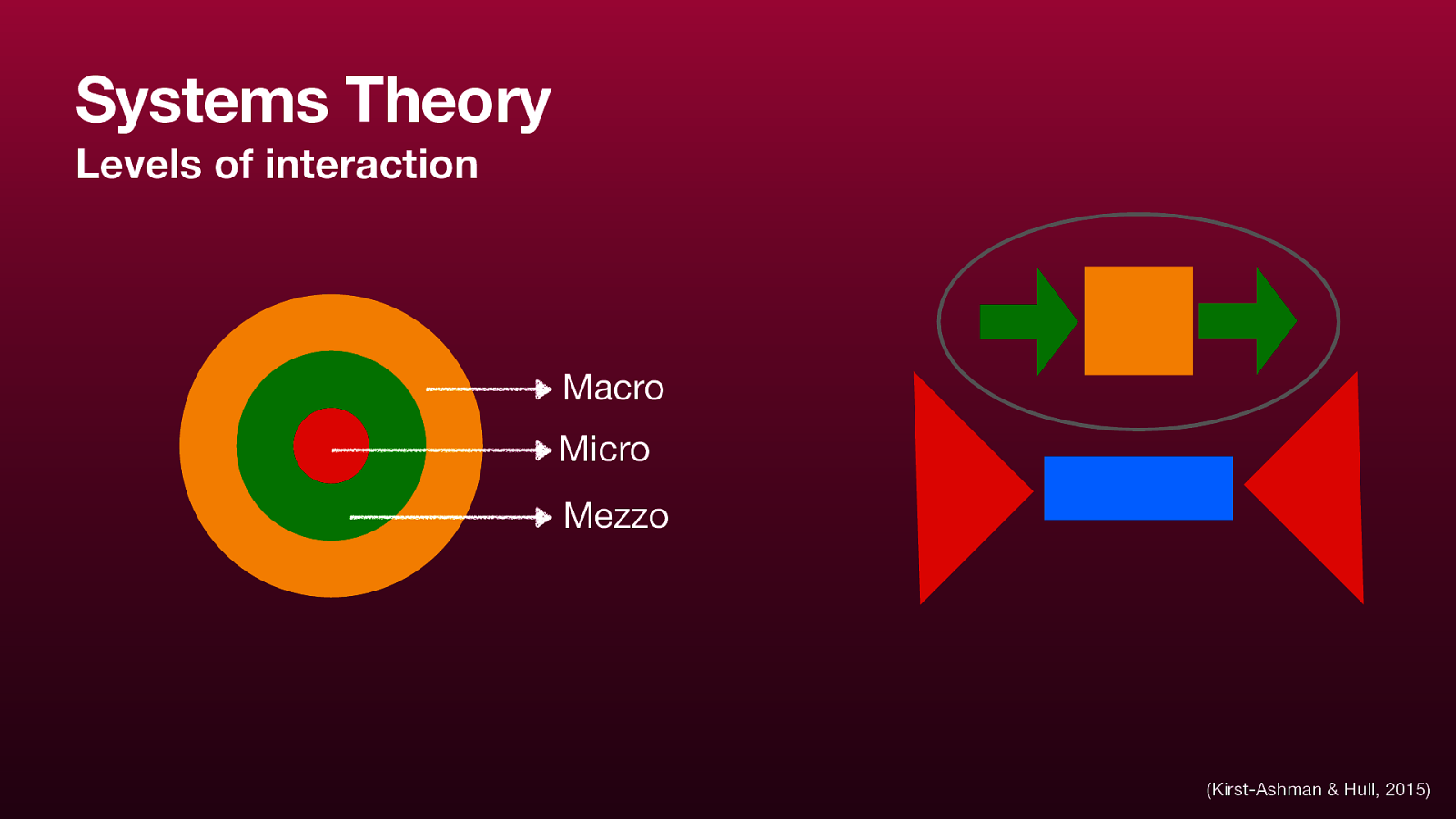
Systems Theory Levels of interaction Macro Micro Mezzo (Kirst-Ashman & Hull, 2015)
Slide 8

A-03: Theory and Practice Integrative Paper Purpose: Students show the integration of theories of practice into their real-world implementation through the assigned Theory and Practice Integrative Paper. Students work with a partner to describe an interprofessional conceptual framework, a ctional client, and the implementation of direct practice with a client using the framework. • APA formatting in strong academic fi writing (e.g., tone, word choice, writing perspective), paper style (paper sections, headers and footers, page layout, and spacing), and citations (in-text citation and reference list) • Description of the theory examined using peer-reviewed academic journal articles (must use both in-text citations and a reference list) • Discussion of a ctional client and their circumstances • Application of the theory to direct practice actions a clinician would use fi Must Include
Slide 9

Save the Work you Do SAVE NOTES YOU TAKE ABOUT A TOPIC SAVE ARTICLES YOU READ [[Connected Topic]] [[Connected Topic]] Bookends For macOS [[Connected Topic]] SAVE PAPERS THAT YOU WRITE
Slide 10

Sample Papers 61 ELEMENTS & FORMAT Sample Student Paper • student title page, 2.3 7th Edition Guide paper title, 2.4, 2.27, Table 2.1, Figure 2.4 group author, 9.11 parenthetical citation of a work with two authors, 8.17 italics to highlight a key term, 6.22 parenthetical citation of a work with one author, 8.17 repeated citation needed, 8.1 use of first person, 4.16 narrative citation in parenthetical running text, 8.11 APA_PM7_Ch2-BLueline.indd 61 8/1/19 7:01 PM
Slide 11

Slide 12

Adaptation Transactions Person in the Environment Interdependence Person Ecological Perspective Interface Energy Coping Environment (Kirst-Ashman & Hull, 2015)
Slide 13

Ecological Perspective De nitions Interdependence the reliance on one person to another. People depend on each others input, energy, services, and consistency Person Energy Environment A focuses on people constantly interacting with various systems around them. So the social workers focused improving the interactions between the person and systems. fi Interface the exact point at which the interaction between an individual and the environment Adaptation Coping Transactions people communicate and interact with those in their environments [can be positive or negative] the natural power of active involvement among people and their environments takes place [input or output] the capacity to adjust to surrounding environmental conditions. This implies change because a person must adapt to change in order to continue functioning in their environment. Social workers help individuals during this process to direct their energies so that they are able to adapt a form of human adaptation and implies a struggle to overcome problems. Refers to the way we deal with the problems we experience. (Kirst-Ashman & Hull, 2015)
Slide 14

Ecological Perspective Levels of Interaction Mezzo Adaptation Transactions Micro Interdependence Macro Interface Person Energy Coping Environment (Kirst-Ashman & Hull, 2015)
Slide 15

Strengths Perspective Implementing Strengths Perspective Don’t take no for an answer Help correct the e ects of being labeled Take advantage of the considerable resources of culture and ethnicity Normalize ff Possibility, solution and strengths focus Focus of Attention: Area’s to look at What people learn as they struggle Personal qualities and virtues Talents that people have Cultural and family rituals, beliefs, stories, and lore Dreams and hopes The community Spirituality / Faith
Slide 16

Identifying Strengths Use the ROPES Possibilities • • • • • • Future focus Imagination Creativity Vision of the future Play What have you thought of trying but haven’t tried yet? Solutions • Focus on constructing • • • • Present focus Emphasis on choice What can be accessed now? What is available and hasn’t been tried or utilized? Resources Personal Family Social environment Organizational Community Options solutions, not solving problems What’s working now? What are your successes? What are you doing that you would like to continue doing? What if a miracle happened? What can you do now to create a piece of the miracle? Exceptions • When is the problem not happening? • When is the problem di erent? • When is part of the hypothetical future • solution occuring? How have you survived, endured, thrived? ff (Graybeal, 2001)
Slide 17
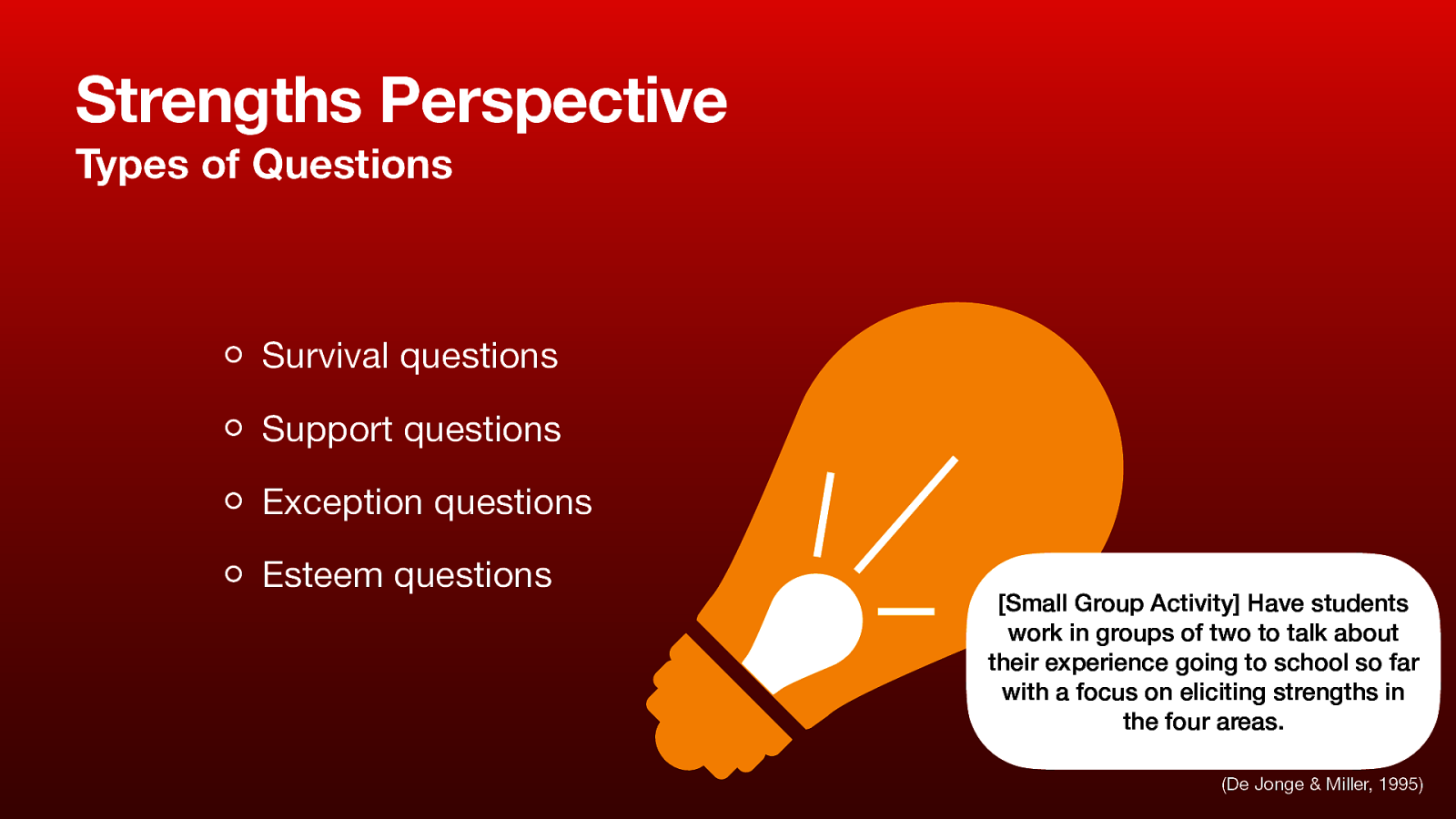
Strengths Perspective Types of Questions Survival questions Support questions Exception questions Esteem questions [Small Group Activity] Have students work in groups of two to talk about their experience going to school so far with a focus on eliciting strengths in the four areas. (De Jonge & Miller, 1995)
Slide 18

Solution Focused Brief Therapy Search for Solutions, not Admire the Problem
Slide 19

Solution Focused Brief Therapy Tenants If it’s not broken, don’t x it Complements Look for exceptions Gentle nudging to do more of what is working Asking questions rather than telling clients what to do Future is negotiated and created Change is constant and inevitable The solution is not always directly related to the problem fi (De Jong, Kim Berg, 2012)
Slide 20
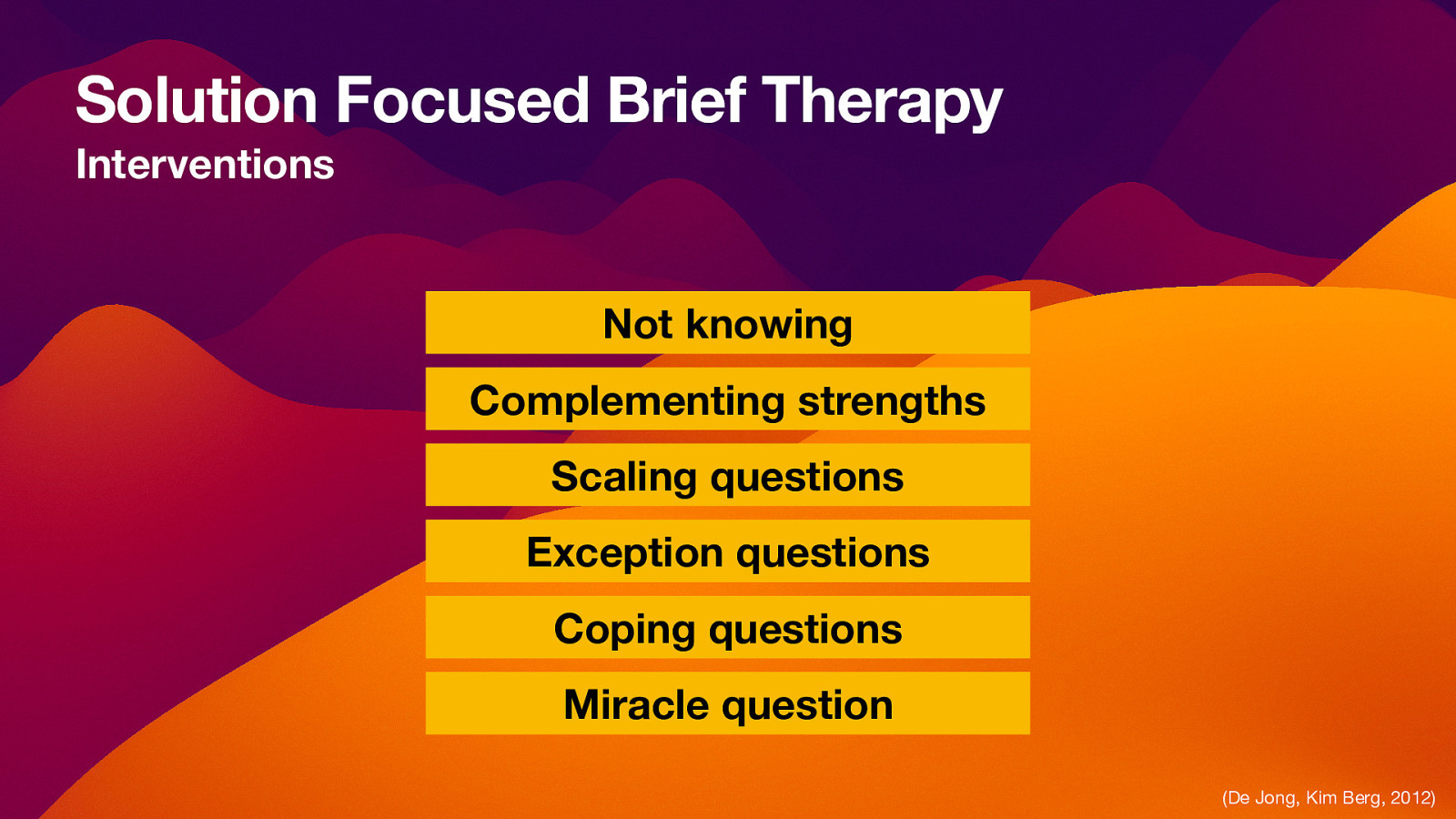
Solution Focused Brief Therapy Interventions Not knowing Complementing strengths Scaling questions Exception questions Coping questions Miracle question (De Jong, Kim Berg, 2012)
Slide 21
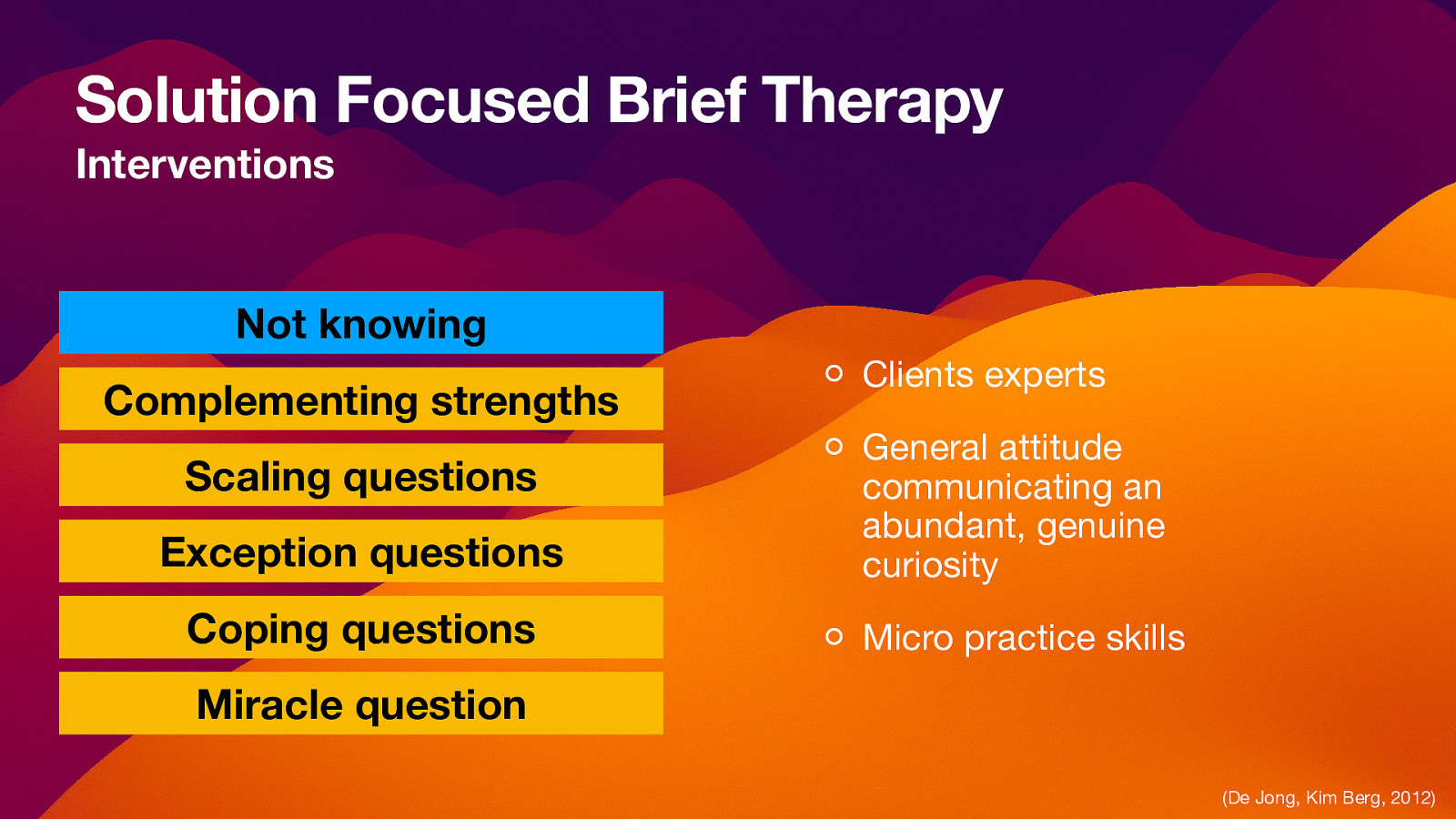
Solution Focused Brief Therapy Interventions Not knowing Complementing strengths Clients experts Exception questions General attitude communicating an abundant, genuine curiosity Coping questions Micro practice skills Scaling questions Miracle question (De Jong, Kim Berg, 2012)
Slide 22

Solution Focused Brief Therapy Interventions Not knowing Complementing strengths Scaling questions Exception questions Coping questions Miracle question Strengths perspective Building rapport and giving hope Direct complements: positive evaluation or reaction Indirect complements: a question implying something positive (De Jong, Kim Berg, 2012)
Slide 23
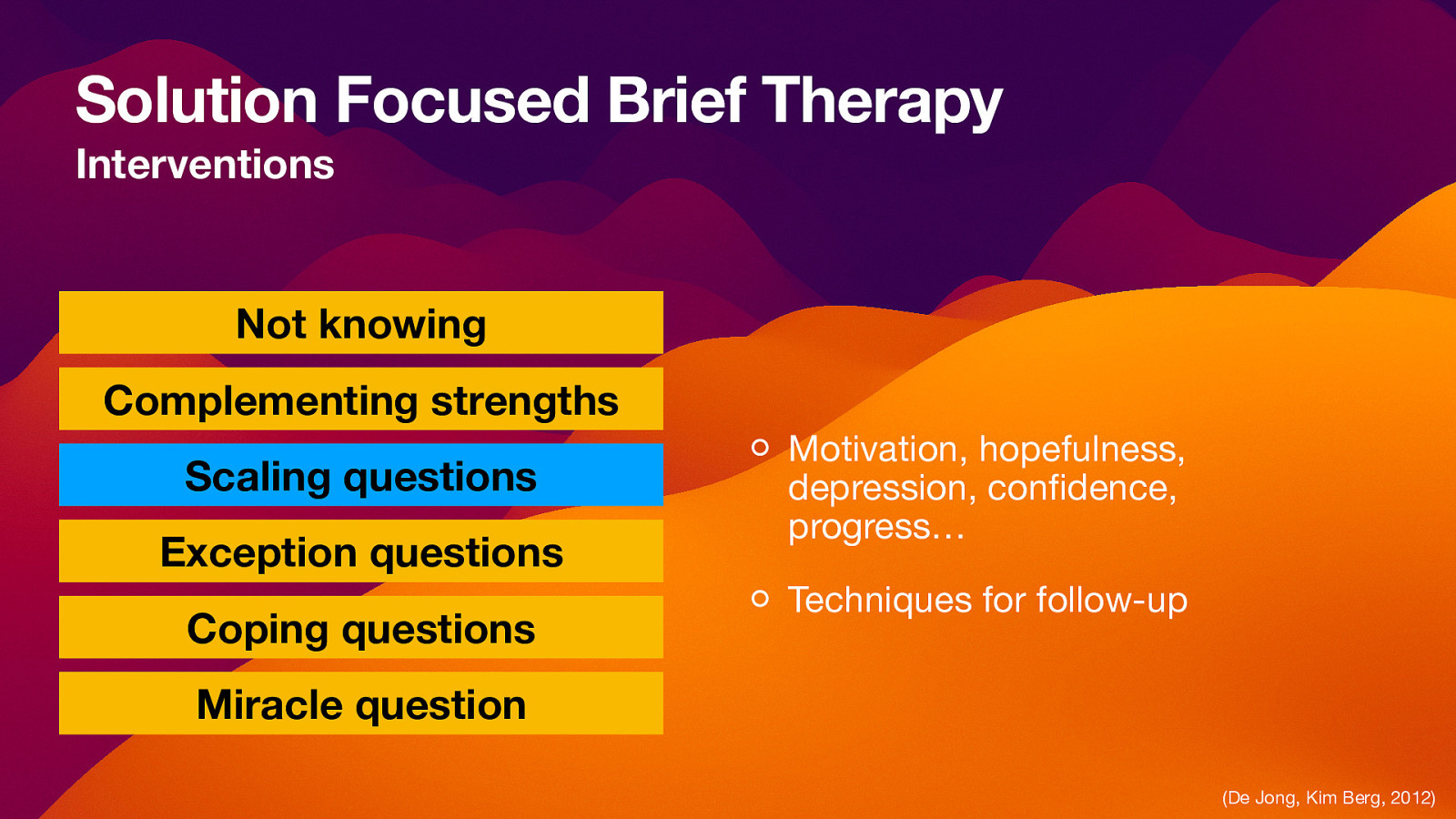
Solution Focused Brief Therapy Interventions Not knowing Complementing strengths Scaling questions Exception questions Coping questions Motivation, hopefulness, depression, con dence, progress… Techniques for follow-up Miracle question fi (De Jong, Kim Berg, 2012)
Slide 24
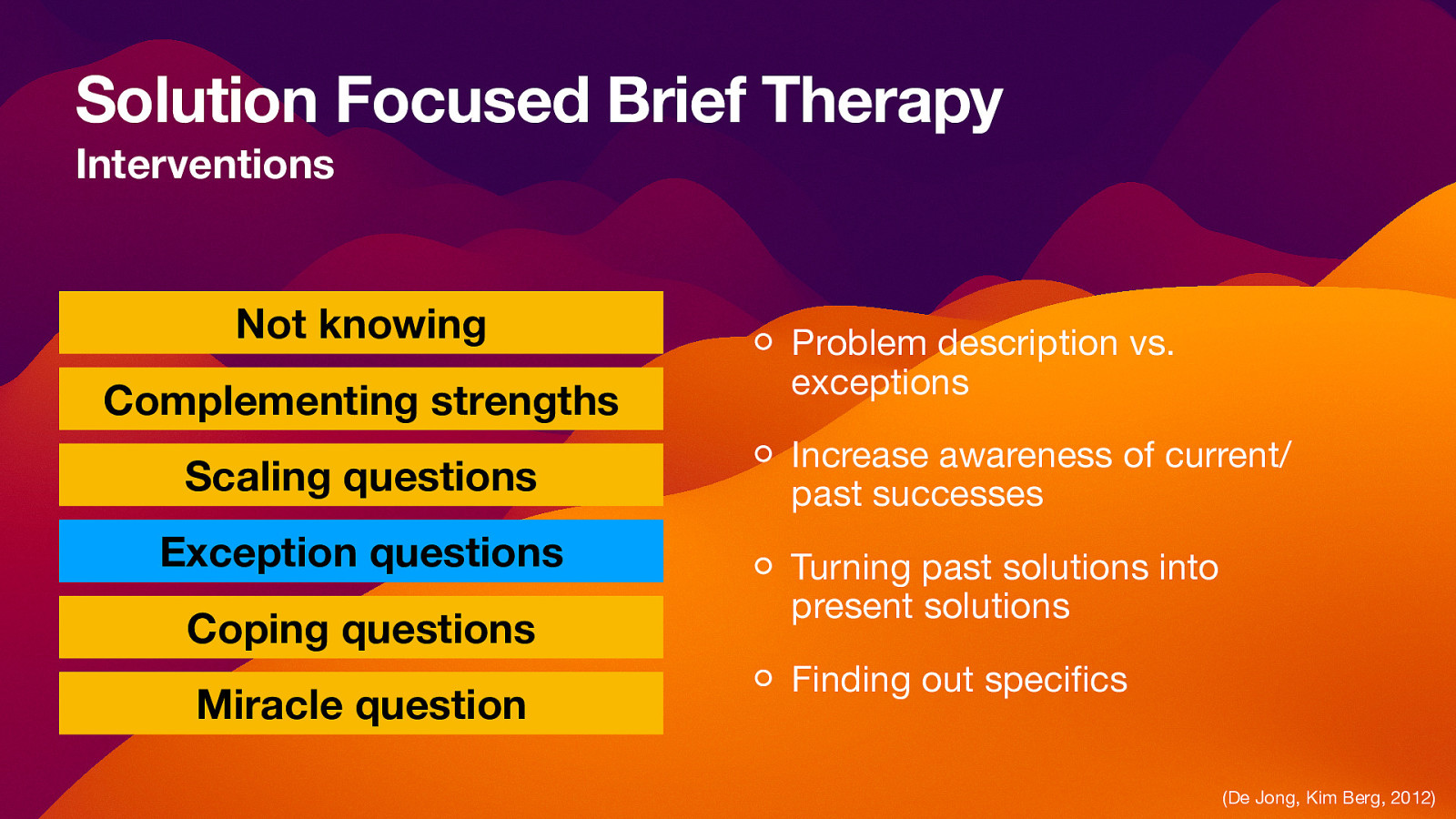
Solution Focused Brief Therapy Interventions Not knowing Complementing strengths Scaling questions Exception questions Coping questions Miracle question Problem description vs. exceptions Increase awareness of current/ past successes Turning past solutions into present solutions Finding out speci cs fi (De Jong, Kim Berg, 2012)
Slide 25
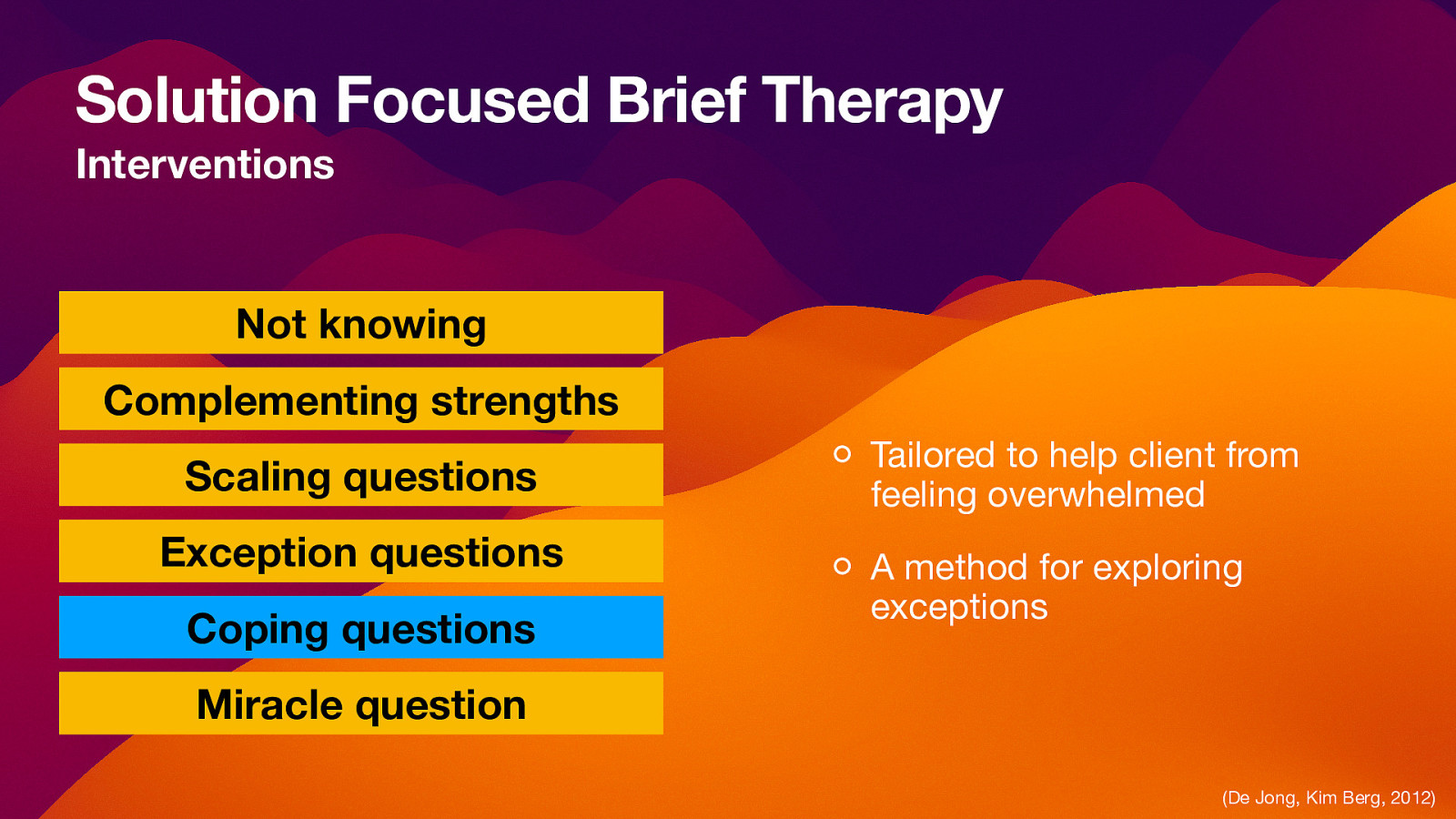
Solution Focused Brief Therapy Interventions Not knowing Complementing strengths Scaling questions Exception questions Coping questions Tailored to help client from feeling overwhelmed A method for exploring exceptions Miracle question (De Jong, Kim Berg, 2012)
Slide 26
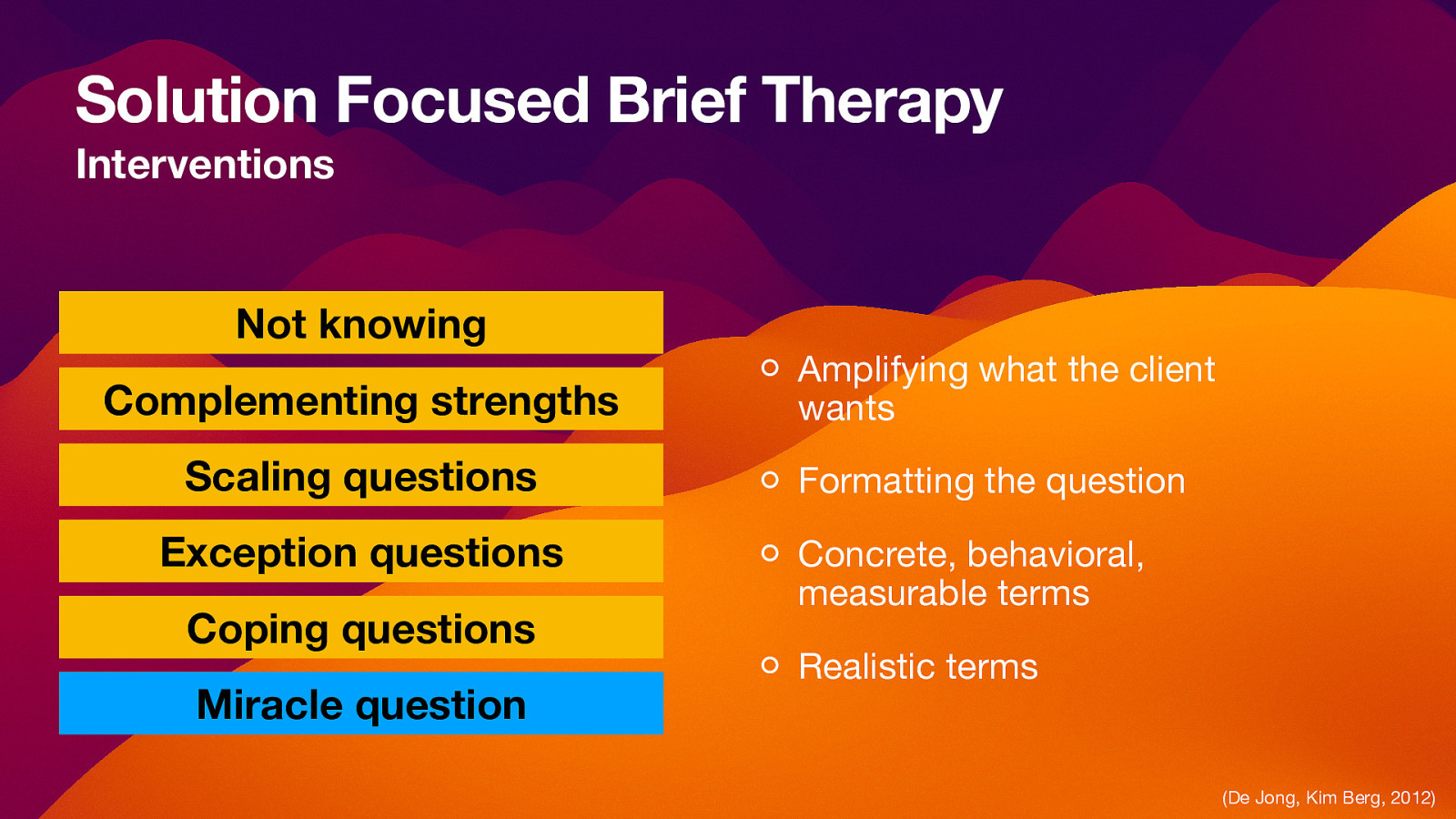
Solution Focused Brief Therapy Interventions Not knowing Complementing strengths Scaling questions Exception questions Coping questions Miracle question Amplifying what the client wants Formatting the question Concrete, behavioral, measurable terms Realistic terms (De Jong, Kim Berg, 2012)
Slide 27
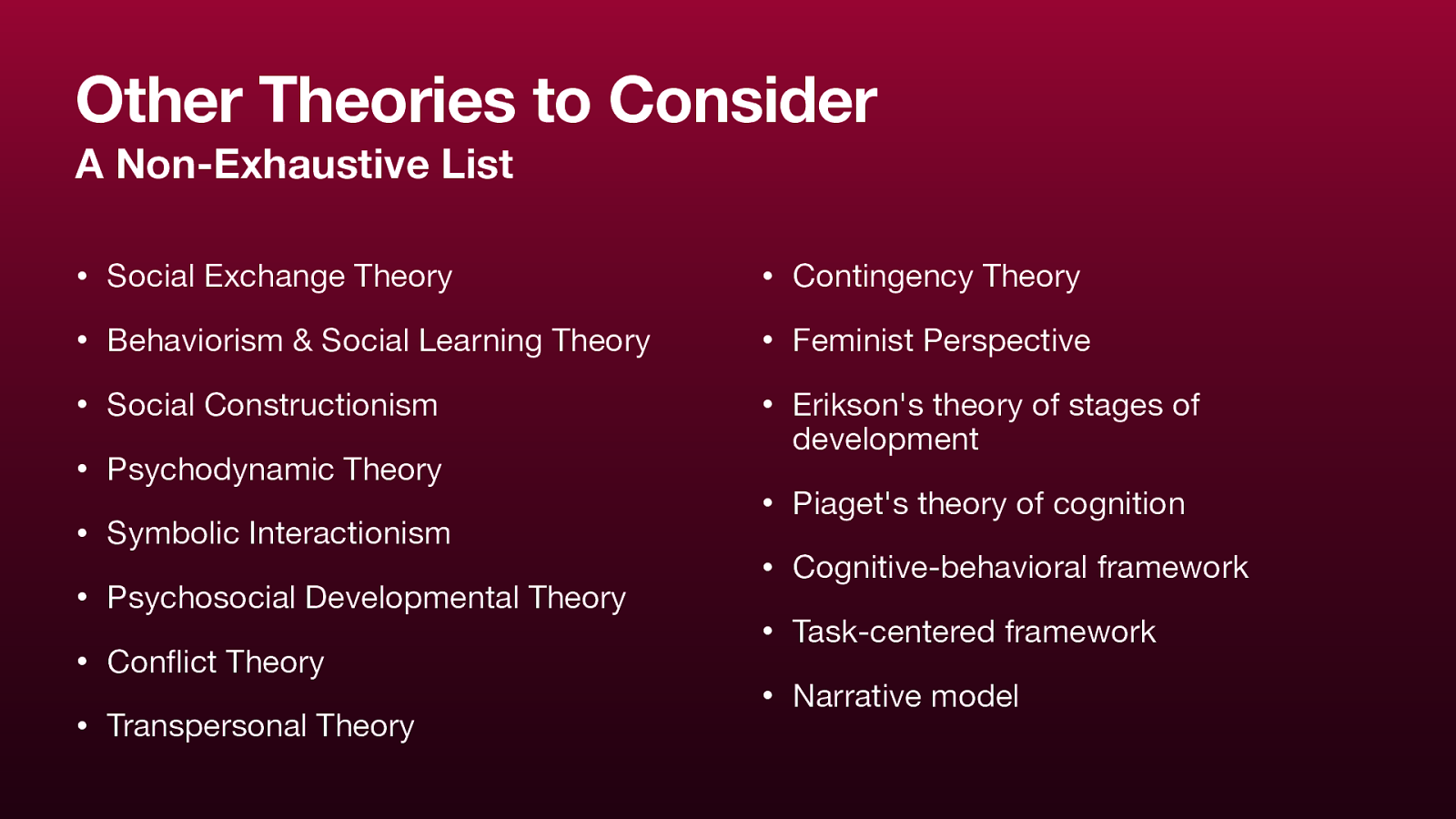
Other Theories to Consider A Non-Exhaustive List • Social Exchange Theory • Contingency Theory • Behaviorism & Social Learning Theory • Feminist Perspective • Social Constructionism • Erikson’s theory of stages of • Psychodynamic Theory • Symbolic Interactionism • Psychosocial Developmental Theory • Con ict Theory fl • Transpersonal Theory development • Piaget’s theory of cognition • Cognitive-behavioral framework • Task-centered framework • Narrative model
Slide 28
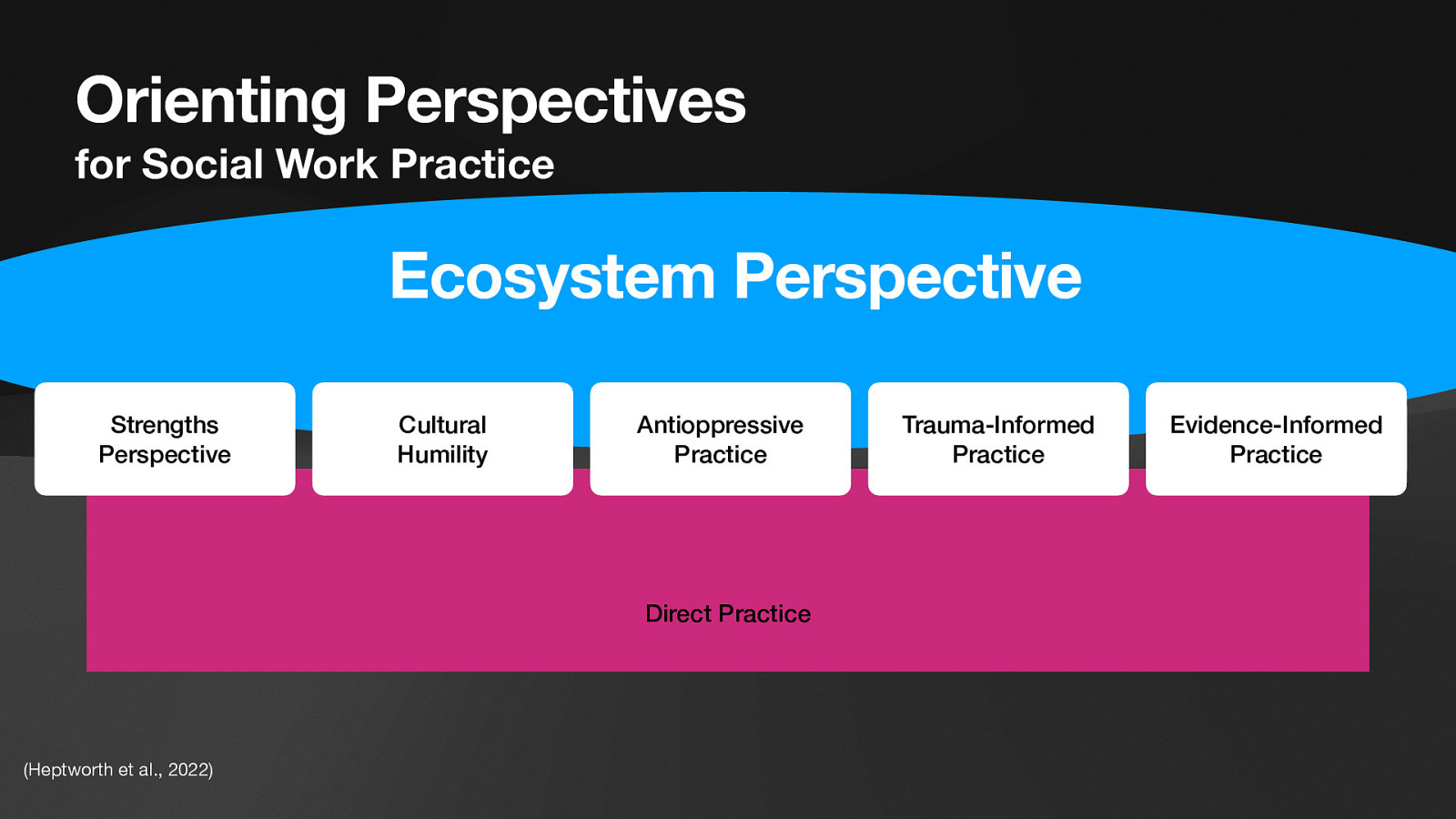
Orienting Perspectives for Social Work Practice Ecosystem Perspective Strengths Perspective Cultural Humility Antioppressive Practice Direct Practice (Heptworth et al., 2022) Trauma-Informed Practice Evidence-Informed Practice